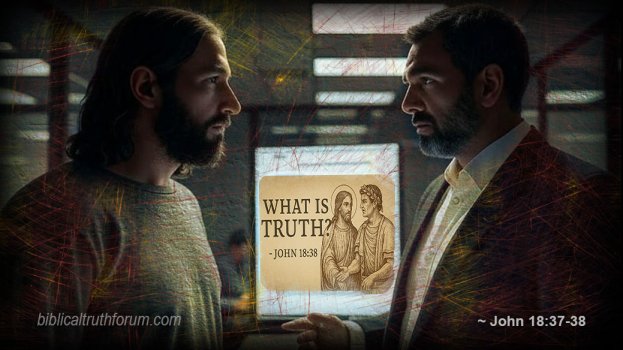
Then Pilate said to him, “So you are a king?” Jesus answered, “You say that I am a king. For this purpose I was born and for this purpose I have come into the world, to bear witness to the truth. Everyone who is of the truth listens to my voice.” Pilate said to him, “What is truth?” After he had said this, he went back outside to the Jews and told them, “I find no guilt in him. ~ John 18:37-38
When Jesus stood before Pontius Pilate, He was not standing as a helpless victim but as the sovereign Son of God fulfilling the very reason He came into the world. In John 18:37–38, we read a powerful exchange: “Pilate therefore said unto him, Art thou a king then? Jesus answered, Thou sayest that I am a king. To this end was I born, and for this cause came I into the world, that I should bear witness unto the truth. Every one that is of the truth heareth my voice. Pilate saith unto him, What is truth?”
That one cynical question, “What is truth?” captures the tragic heart of spiritual blindness. Pilate, faced with the very embodiment of truth standing before him, could not recognize it. He wasn’t sincerely searching. His words dripped with frustration and unbelief, showing that he had no interest in the truth Jesus offered. This is what separates those who belong to God from those who are lost: “Everyone that is of the truth heareth my voice.” If someone rejects the voice of Jesus, they are not of the truth, no matter how religious or powerful they seem (John 10:26–27).
Right after this exchange, Pilate did something remarkable: he went back to the Jews and declared, “I find in him no fault at all” (John 18:38). This confirms the innocence of Christ, not only in the eyes of God but even before the corrupt judgment of Rome. Jesus had committed no sin, no crime, no offense. Yet both the Jewish leaders and the Roman authorities pushed forward with His execution. The perfect, sinless Son of God was condemned by guilty men, fulfilling the Scriptures that said He would be “numbered with the transgressors” (Isaiah 53:12) though He had “done no violence, neither was any deceit in his mouth” (Isaiah 53:9).
This trial scene is not just a moment of injustice. It is a divine spotlight on the world’s rejection of truth. Jesus came to bear witness to the truth, the truth about God, about man’s sin, about judgment, and about salvation. And when the world looked that truth in the face, they crucified it. But for those who belong to God, His voice still calls out, and His truth still shines.
God did not leave truth open to human opinion. He gave us His Word in the Bible. Jesus said in prayer to the Father, “Thy word is truth” (John 17:17). Every word of Scripture is breathed out by God (2 Timothy 3:16), and those who reject the Bible are rejecting the very truth of the God who gave it. If someone says they believe in God but denies the truth of His Word, they do not believe in the one true God at all. They have created a false god of their own making. God’s truth is not negotiable, and it is not hidden. It is written clearly in the pages of Scripture, and only those who humble themselves before it will ever know Him.
The question is not whether truth exists. It does. The question is whether we will receive it. “Sanctify them through thy truth, thy word is truth” (John 17:17). If we reject that, we reject Him. If we hear Him, we prove we are of the truth. There is no middle ground.

